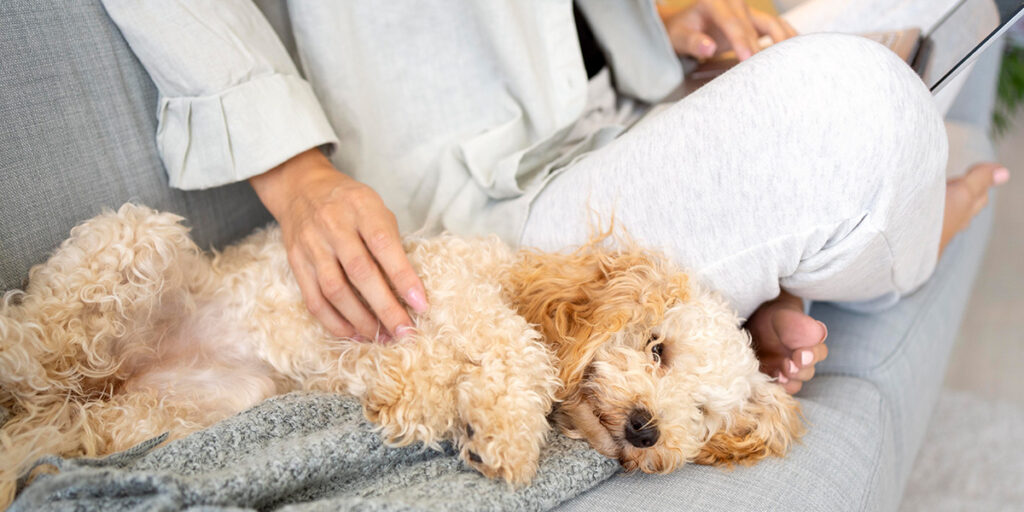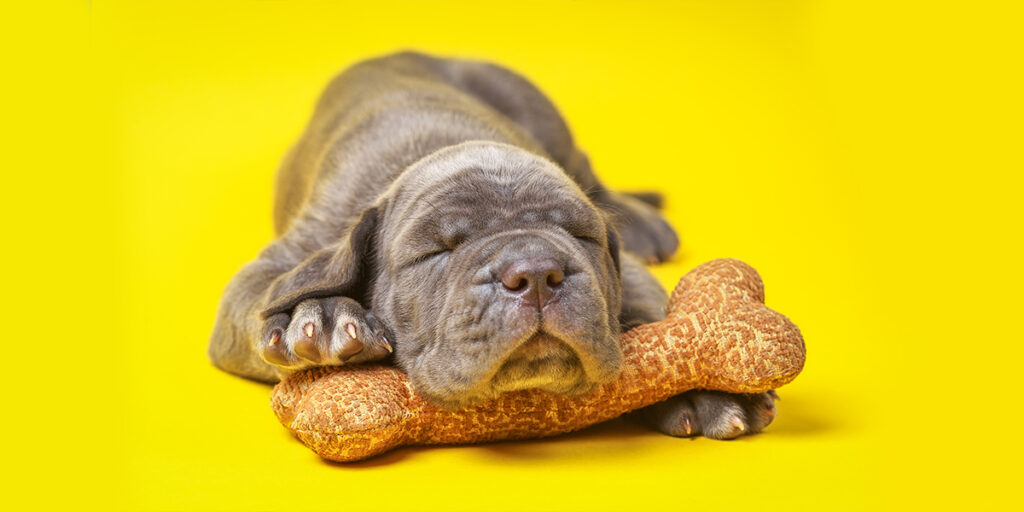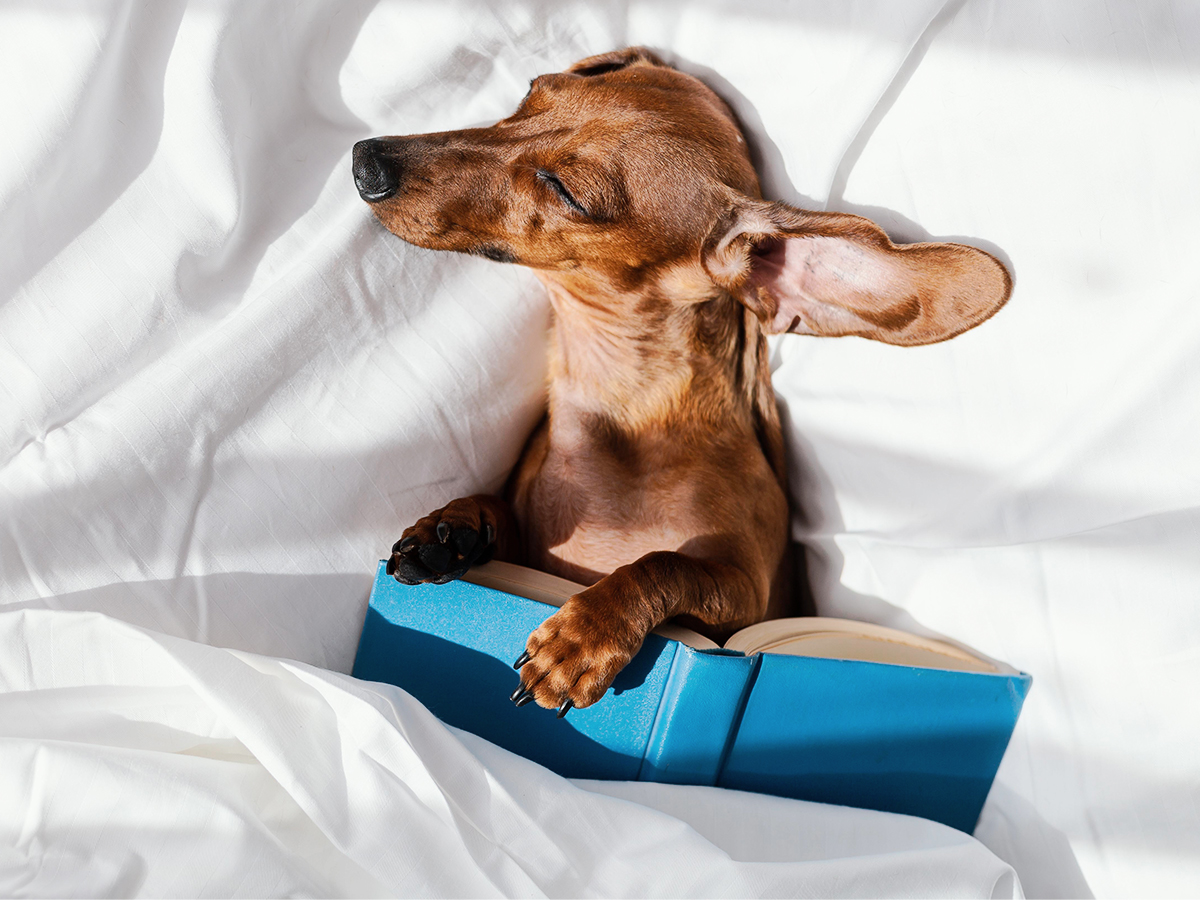Becoming a new dog parent and disciplining a dog is everything but easy. In the first place, you need to establish a few habits to make life easier for your puppy.
One of these habits is the sleeping routine.
Numerous questions arise. Among them is the question of how to get a puppy to sleep.
We have carefully picked essential information that we are ready to share with you.
Let’s jump right into it!
Table of Contents
3 Tricks That Will Help Your Puppy Fall Asleep Faster
#1 – Increased Physical Activity
The puppies spend over 70% of their time sleeping.
Puppies sleep pretty often because of their low energy level.
The process of discovering the environment is a complex activity for them. That is why they often know to be sleepy.
However, due to a larger amount of sleep, puppies still stay awake and can make noise at night. To prevent this phenomenon in time, provide your puppy with an adequate level of physical activity.
Of course, the level of physical activity depends on the breed of your puppy. For example, Samoyeds have more energy than Poodles.
Sometimes it is enough to take your puppy out 3 to 4 hours before bed. In less than 30 minutes, you will notice that your puppy is slowly falling asleep.
#2 – Established Bedtime Routine
New dog parents mostly skip this step. But, in fact, this is one of the most important tasks.
Adjust the bedtime to your needs. For example, if you are an early riser, try to pass the same habit on your puppy.
If you go to bed at 9 PM, turn off the light in the room where your puppy is sleeping. So the puppy will know that turning off the lights is a sign of sleep.
Of course, you need to provide silence after this step so that the puppy can immediately fall asleep.
So after a specific sleep schedule, remove all sources of distraction:
- Turn down the music
- Turn off the TV
- Set the phone to silent mode.
Following this step, you’ll definitely see results!
#3 – Choosing a “Puppy” Room
It may sound like an unnecessary decision, but it will surprise you how this can affect the positive behavior of your puppy.
Namely, choose a room that you think is adequate for your puppy. Please make it a room filled with sunlight during the day so that your puppy will enjoy spending a lot of time when you are busy, for example.
The next task you need to complete is choosing the right puppy bed. Again, our advice is not to use the crate technique.
Another important thing about a puppy room are the toys.
Put a couple of toys around the place where your puppy sleeps. Before going to bed, playing with toys can help your puppy fall asleep quickly.

Common Questions About Puppy Sleeping Routine
#1 – How many hours does a dog sleep in a 24-hour period?
The average hours of sleep a puppy usually has varied from breed to breed. However, the average amount of sleep is usually around 15 hours or more.
#2 – Does the amount of dog’s sleep affect the eating?
No! The number of hours your dog sleeps does not directly correlate with how much food they eat or how often they need to go out for bathroom breaks.
However, this will change as time goes on and they get older.
#3 – Is the sleep disorder associated with some diseases?
In most scenarios – the sleep disorder in dogs is not associated with any disease. Instead, the condition simply means that the dog suffers from difficulty falling asleep, staying sleeping, or sometimes even waking up at night and having no reason for it.
Sleep disorders can be temporary or permanent. For example, dogs are often diagnosed with this problem during their puppyhood when they need more time to adjust to new surroundings.
It’s also quite common among older dogs who suffer from arthritis and other health problems.
#4 – What should you do if your puppy has a sleeping disorder?
If your puppy has a sleeping disorder, it is essential that you contact the vet for an appointment. The veterinarian will let you know how to help with this issue and prevent it from happening in the future.

#5 – What to do when you notice that the puppy woke up during the night?
Your puppy may have been “upset” in their sleep and had an uncomfortable dream.
The best thing you can do is gently pet your pup so that they know you are there and that everything is okay.
This should calm them down without waking them and allow them to go back to sleep.
It’s also important that you don’t get up every time you hear a puppy whine at you.
#6 – Should puppies sleep in the dark?
Some puppies and dogs find nightlights comforting. Others, however, enjoy the dark without any light or distractions.
We often get questions about nighttime lighting for puppies and dogs of all ages: should they sleep in the dark or with some light? Of course, the answer depends on your dog’s needs.
Night lights are not necessary for everyone, especially when there are no fears in the dark. Some puppies and dogs find nightlights comforting. Others, however, enjoy the night without any light or distractions.
#7 – What is the best temperature for my puppy’s sleep?
Check the room temperature around where your pet sleeps. Experiment with a few varying temperatures to find what works best. We recommend a room temperature between 68-72 degrees Fahrenheit (20-22 degrees Celsius).
#8 – How can you tell if a dog is cold at night?
Suppose you notice your dog shivering, a sudden drop in activity level, or is avoiding physical contact with other dogs and humans. In that case, it could mean your dog isn’t feeling well and might be cold at night.
Dogs that are cold tend to seek out warm places to curl up (usually indoors), like behind furniture and in corners. They may also be lethargic, seemingly disinterested in anything but curling up for warmth.
Conclusion
The whole process of “getting your puppy to sleep” can really be complicated. It is essential to pay attention to the latent causes that affect your puppy’s sleep routine.
Eliminate all sources of distraction, as mentioned earlier, and try to stimulate your puppy to sleep as much as possible.
Now it’s your turn!
Which steps of above mentioned will you take next to get a puppy to sleep?
Let’s see your opinions in the comments below!
Good luck!
